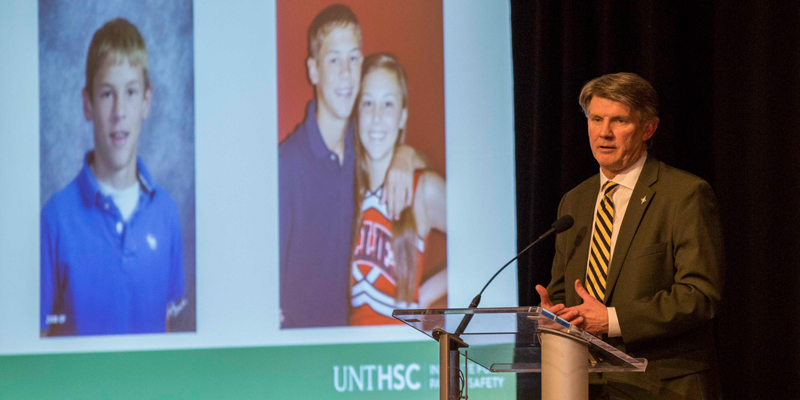From a family’s heartbreak comes hard patient safety lessons
By Jan Jarvis

For a brief moment, 13-year-old Quinn Kott seemed to bounce back from whatever was racking his body, causing nausea, garbled speech and loss of consciousness.
He had spent more than two hours slumped in a wheelchair at Hill Country Memorial Hospital’s emergency room in Fredericksburg, Texas, where the staff was inattentive and rude. Then out of the blue, Quinn asked for a cheeseburger with ketchup.
“Those were the last words I would hear my son speak,” said his father, Brad Kott, during UNT Health Science Center’s third annual Patient Safety Summit, held Feb. 8-9 in Fort Worth.
UNTHSC’s Institute for Patient Safety led the summit, titled “Ethical Imperative of Highly Reliable and Safe Patient Care.” It addressed some of the safety measures and improvements that developed from tragedies, from the Space Shuttle Columbia disaster that killed its seven-member crew in to the heartbreak of the Kott family, whose son died in 2009.
Presentations during the summit center around three topics – leadership, culture and ethics – along with the importance of creating high-reliability teams, developing a safety culture and addressing the impact of unconscious bias on the quality of care.
A number of critical breakdowns contributed to the Kotts’ tragedy. Four hours were lost while Quinn lay unconscious in an ER bed because there was no doctor available to admit a pediatric patient. Vitals signs were scribbled on a napkin by the staff nurse. By the time Quinn was finally examined and then rushed to a hospital in San Antonio, more than 13 hours had passed.
There was nothing more that could be done. Quinn died soon after from a massive stroke.
If reliving that nightmare before an audience at the Patient Safety Summit was painful, imagine what it took for Brad and Sheryl Kott to later partner with the hospital where their son received such poor care. But that is exactly what the Fredericksburg couple did in an effort to prevent such a tragedy from happening to another family.
For UNT Health Science Center President Dr. Michael Williams, Quinn’s death was a defining experience. Speaking at the summit, he recalled how as CEO of the hospital, he had the chance to change the way health care was practiced.
Since Quinn’s death, the hospital has worked to turn things around by reducing ER wait times, eliminating falls and providing five-star customer service.
But the hospital went beyond instituting measurable goals to improve quality. Instead of taking the defensive approach, Dr. Williams choose to reach out to the family and ask them to partner with the hospital to make it better. He hoped to find a more human way of taking care of patients. In short, he wanted to do the right thing.
In time the Kotts decided to join in the effort. Improvements at the hospital came, but too late to save their youngest child.
At UNT Health Science Center, health care providers are being trained in a team-based approach that puts the patient at the center and captain of the team, Dr. Williams said. It requires physicians to really listen to their patients.
“It was a crucible moment for the hospital,” Dr. Williams said. “It came at a time when we had an opportunity to change the direction we were going – or not.”
The two-day summit is presented annually by the Institute for Patient Safety, which was established to make health care safer in North Texas and the nation. It opened in 2016 with the assistance of state Senator Jane Nelson, who helped secure funding from the Texas Legislature.
Nationwide, more than 250,000 American die annually from preventable medical errors. These mistakes lead to an estimated $50 billion in added U.S. health care costs and up to $1 trillion in lost human potential and contributions.




Social media